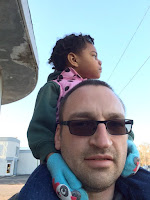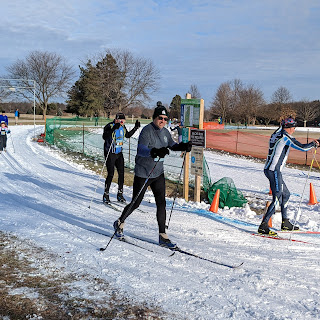A parent's perspective on RTT's episode about transracial adoption
Regardless of what you think about race in America, my
experience as a white man is undoubtedly different than the experience my
daughter has, and will continue to have, growing up. I never feel like I
understand quite enough, and I always want my daughter to feel like she can
come to me for help, so I always push myself to learn more. Her experience growing
up will be vastly different than mine in part because we are a transracial
family.
To try understanding what The Kid might face growing up, I
follow several transracial adoptees and their journeys online, including Angela
Tucker and her series, The Adopted
Life. Watching the series and reading any of the interviews she shares
online has helped me confront fears that I have as an adoptive parent and to
better understand my
own history having never met my birth father.
When Angela took to Twitter to announce that the episode of
Red Table Talk featuring her story was going to air soon, I was nervous about
how they would portray her story. She has been brutally honest about her
experiences; how would that be portrayed in a show that is typically under 25
minutes
Three minutes in and I was in tears.
“Being a transracial adoptee, it is difficult to share what
we really feel because we have parents who raised us and love us, and we don’t
want to appear that we’re not grateful for what they’ve done. For me to talk
about transracial adoption honestly is to hurt somebody,” she said.
Take out the word transracial and that is exactly how I feel
about my family, specifically my mom.
After several years of stops and starts,
when I finally decided to search for my birth father, I felt that I had
betrayed my mom. When I finally decided to search, it was partially because I
was tired of hurting myself. From then on, every decision I made about the
search was partially informed by this sense of either betraying my mom or
myself. I think I will always struggle with that.
As I was processing these feelings, I also started praying
that I can help The Kid avoid feeling the same way. She knows she was adopted,
that Gladys and I wanted a family and jumped at the chance when God asked us to
raise this little girl. She used to ask me if I ever met my birth father and is
very aware of what the past year has been like for me. My personal experience
tells me that she will probably want to know more about her birth parents, and
I need to prepare myself so I can be as supportive as she needs me to be.
The rest of the episode was complicated. Knowing that there
was probably at least two hours of taping to make a 22 minute show, I know
there was a lot of the conversation that was left on the editing floor. It
was edited to make the questions Angela has about her identity look more dramatic
than they probably feel in real life. Sadly, it was edited to emphasize
that she absolutely had to make a choice about her identity in that moment,
ignoring her own agency over her life.
A few years ago, I read Laina
Dawes’ book, What Are You Doing Here?, after listening to her
interview on NPR. She was also adopted by a white family from a
predominantly white community and became a heavy metal fan in high school,
something she hid from the few black friends she had in order to be accepted.
She wrote, “Most importantly, I learned that in order to maintain my sanity and
love myself for whom I was, I had to be me – whether I lost my “black pass” or
not,” a line that immediately came to mind when I was watching Angela’s
interview on RTT.
Which is why I had trouble reading Laina’s book and watching
this episode of RTT. Regardless of the steps we take to help The Kid learn about
her birth culture, and no matter how black she feels, solely because she was
adopted by a white man and a Puerto Rican woman who wanted to have a family, she
will probably never be accepted by any of those cultures.
Thought of another way, it’s just another obstacle that we
will tackle together as a family. One that I pray will make The Kid a stronger
person.



